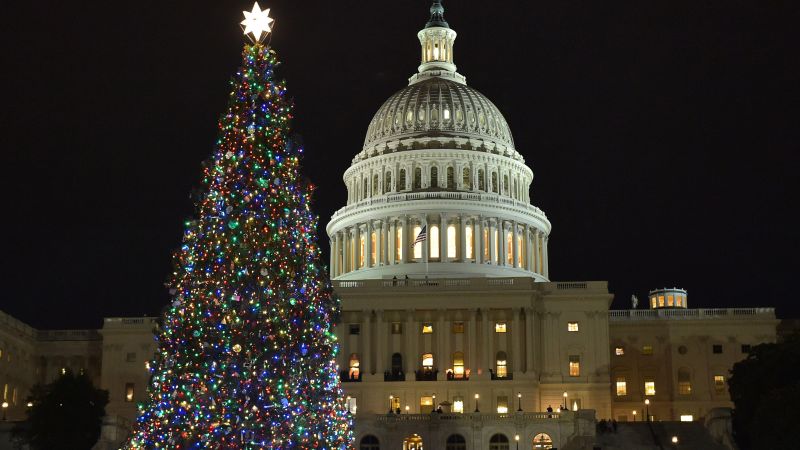

CNN
—
The annual dash to fund the government is starting to sound like a bad Christmas carol: 12 spending bills, $1.7 trillion, 4,000-plus pages, a single massive end-of-year vote and a lifeline for the lobster industry.
This is the bizarre way your government works. Rather than pass spending bills in regular order or throughout the year, the leaders on Capitol Hill punt on the process until the last possible moment when it’s vote “yes” or shut down the government.
Democrats are the ringleaders this year, but next year it will be Republicans in charge of the House and they’ll have to either make good on pledges never to do it this way again or we’ll find members of Congress and senators right back here again, aching to be home for the holidays rather than voting on things they should have done earlier in the year.
The Senate passed the massive year-long funding bill Thursday and is waiting for the House to do the same before it can go to President Joe Biden’s desk. But, having been down this road before, senators also tried to buy a little extra time by also clearing on Thursday afternoon a bill to extend the government funding deadline by one week, to December 30. The House is expected to do the same on Friday before voting on the broader funding bill.
House Republican leader Kevin McCarthy, however, could draw out the last-minute work with a lament on the House floor, known as a “magic minute,” which allows party leaders to speak as long as they want. The California Republican, who’s hoping to become speaker in the new year, has promised not to let government funding work this way.
Recent memory is littered with such threats. President Donald Trump promised to veto any “omnibus” bill, endured a government shutdown and then ended up signing versions throughout the rest of his presidency.
The Senate leaders are proud of the bill.
“A lot of Sturm und Drang, a lot of ups and downs, but the end, a great result that really helped the American people,” said Senate Majority Leader Chuck Schumer.
Senate Minority Leader Mitch McConnell, facing criticism from fellow Republicans about the process, argued he wouldn’t have done it this way.
“But given the reality of where we stand today, senators have two options this week, just two,” the Kentucky Republican said on the Senate floor. “Give our armed forces the resources and certainty that they need or we will deny it to them.”
McConnell focused on the defense spending, but there was so much more, including billions earmarked by lawmakers for projects in their home states and districts.
The return of the earmarking progress, now called Community Project Funding, allows even those lawmakers who will vote against the omnibus to direct spending back home. Rep. Elise Stefanik of New York, for example, lists her requests for appropriations on her website. They include taxpayer money for a wastewater plant in Greenwich, a police station in Moriah, a childcare facility in Ogdensburg, among others. But she’s expected to join other House Republicans and oppose the final bill.
The difficulty for lawmakers like Stefanik and McCarthy will come next year when they face calls among hardline Republicans to refuse raising the debt ceiling without steep federal spending cuts.
Schumer said he will wait to negotiate with McCarthy on that topic until next year, but had this warning that the House GOP leader must listen to more moderate Republicans.
“There is a large chunk of Republicans, perhaps a majority in the House and the Senate who are not MAGA,” Schumer, a New York Democrat, said. “And this election showed them – I’ve talked to them – that following MAGA is like Thelma and Louise, going over a cliff.”
The omnibus was not just about spending and keeping the government’s lights on. Lawmakers also threw in some extra packages, mostly bipartisan efforts they didn’t have time to turn to during the year.
This year those included:
- Electoral Count Act – a bipartisan effort to avert Insurrection 2.0 and clarify that no, the vice president cannot simply reject election results
- 401(k)s – much-needed updates to federal rules about retirement accounts
- Tech – a ban on TikTok from federal government devices
- Education – higher maximum Pell grant awards
- Ukraine aid – an additional $45 billion, which will allow the Pentagon to back Ukraine for some time
- Military and veterans – funding for a 4.6% pay raise for troops and a 22.4% increase in support for VA medical care
- And that lifeline for the lobster industry.
There’s a lot more. No human has read the entire thing, which GOP Sen. Rick Scott of Florida pointed out, is “three times the size of the Bible.”
That doesn’t mean many of its parts, which were cobbled together from committees’ work throughout the year, haven’t been scrutinized.
But for many reasons – lawmakers are frequently distracted by other matters like judicial nominations, for instance – these things get delayed until the last minute.
But mostly, it seems like leaders have found it’s easier to ram something through when the vote is framed as must-pass and it’s the only thing standing between them and the holidays.
